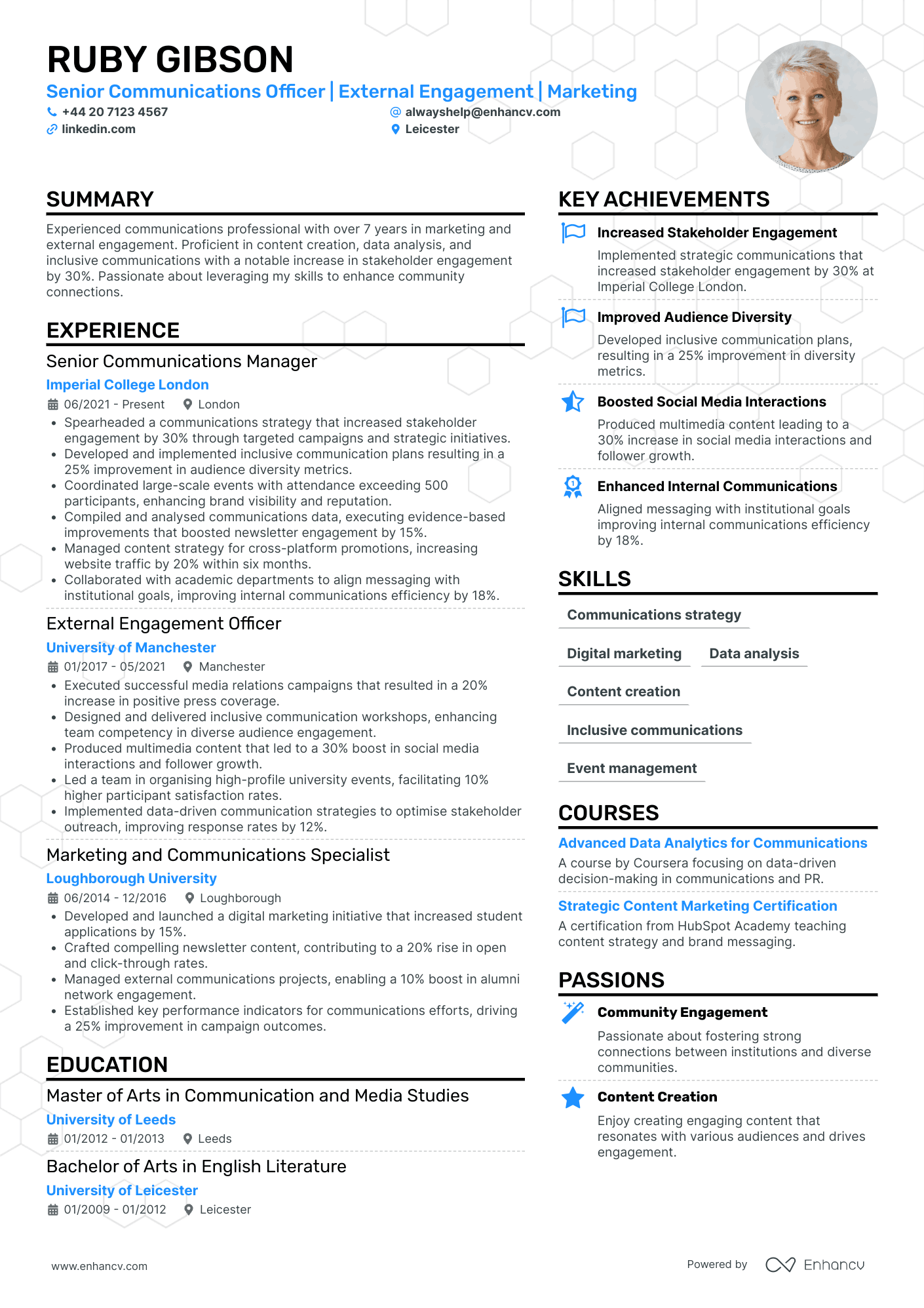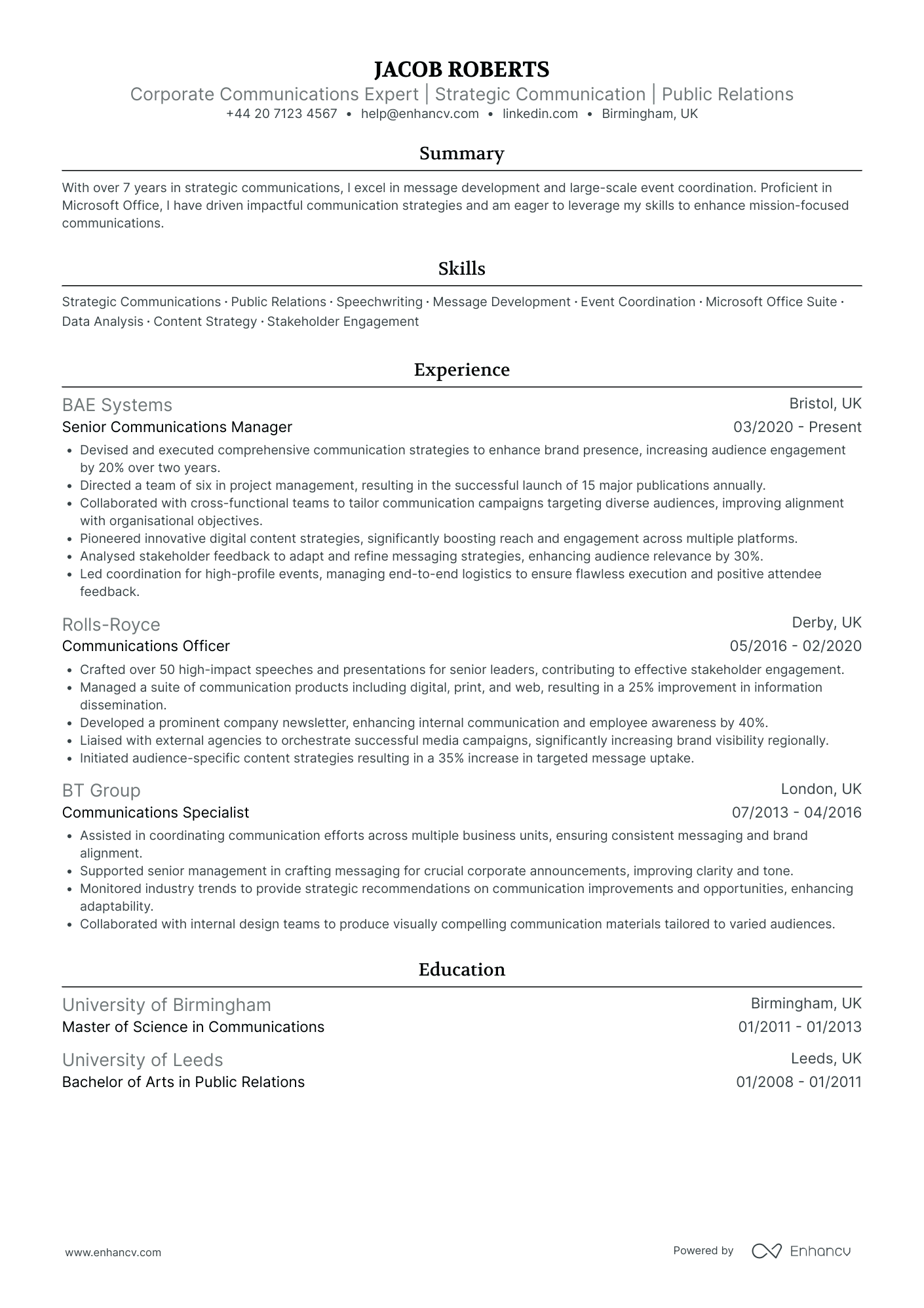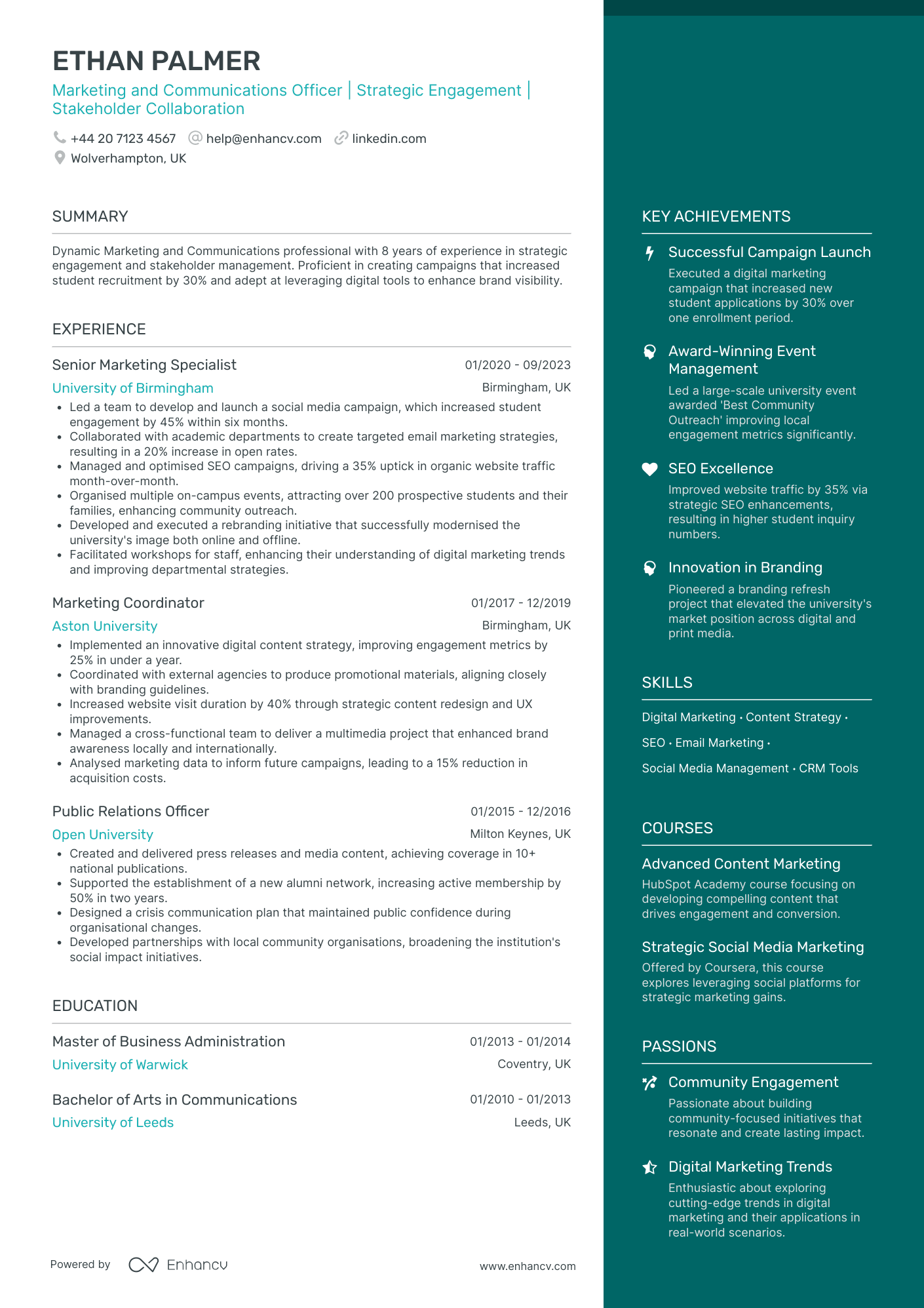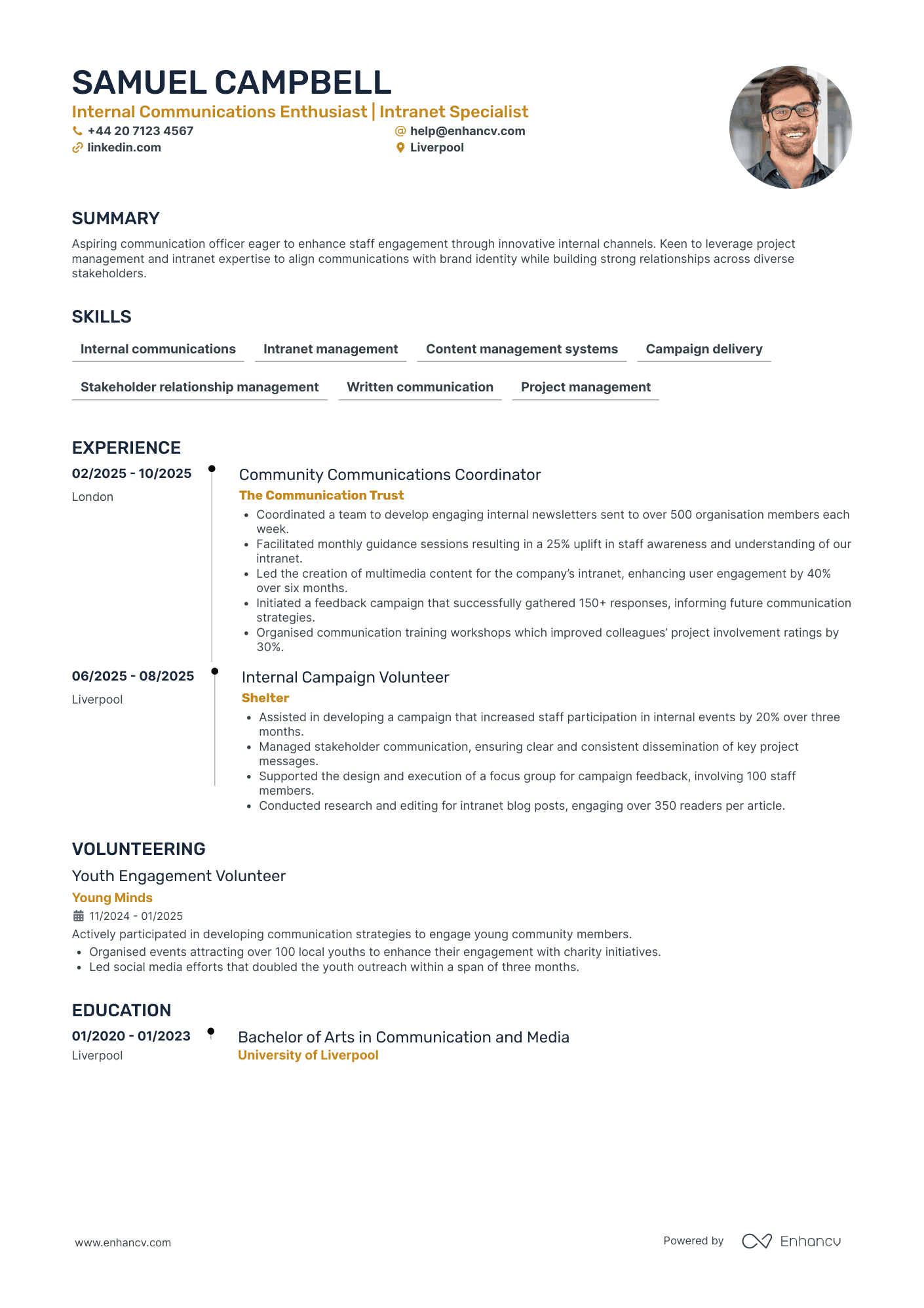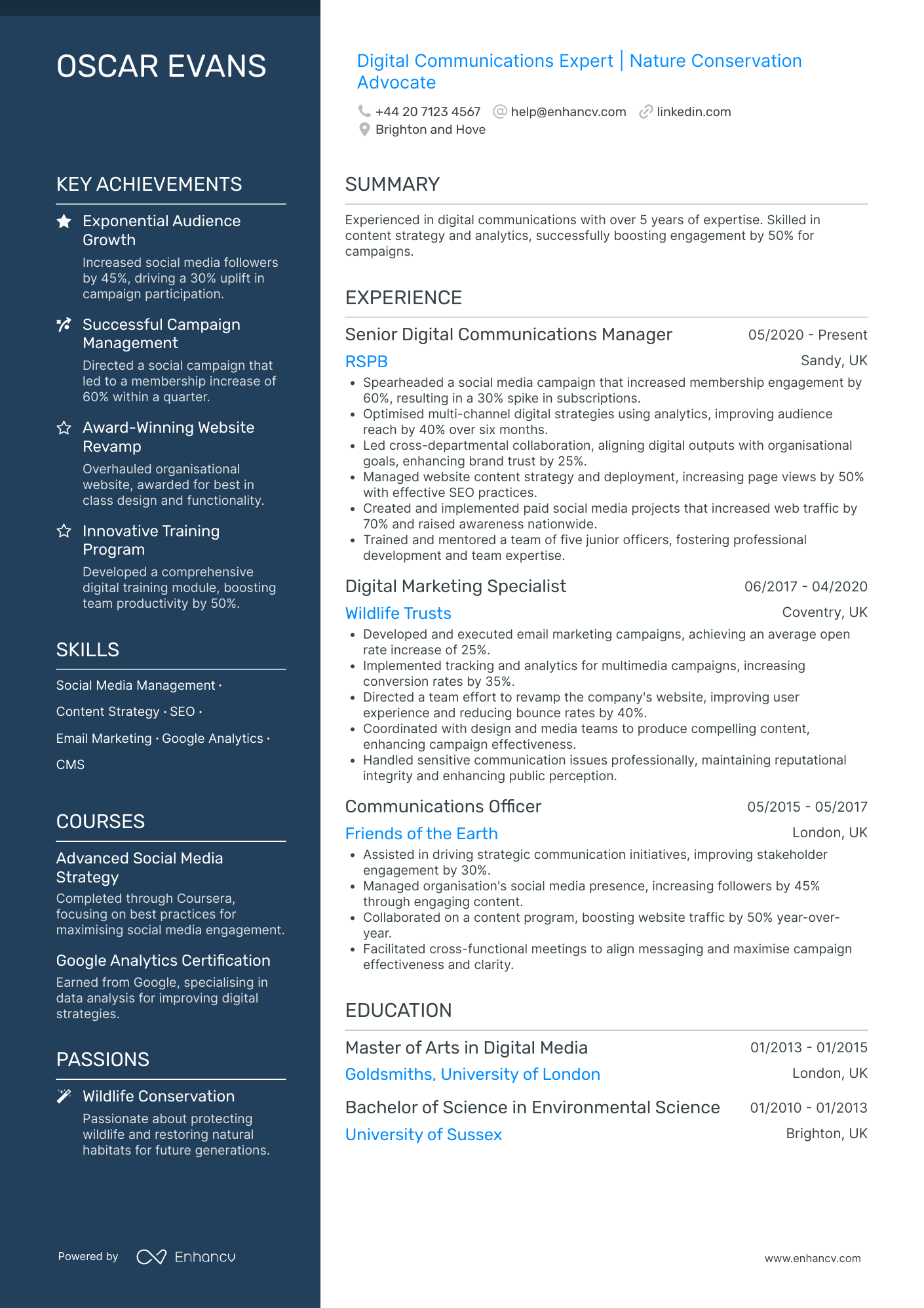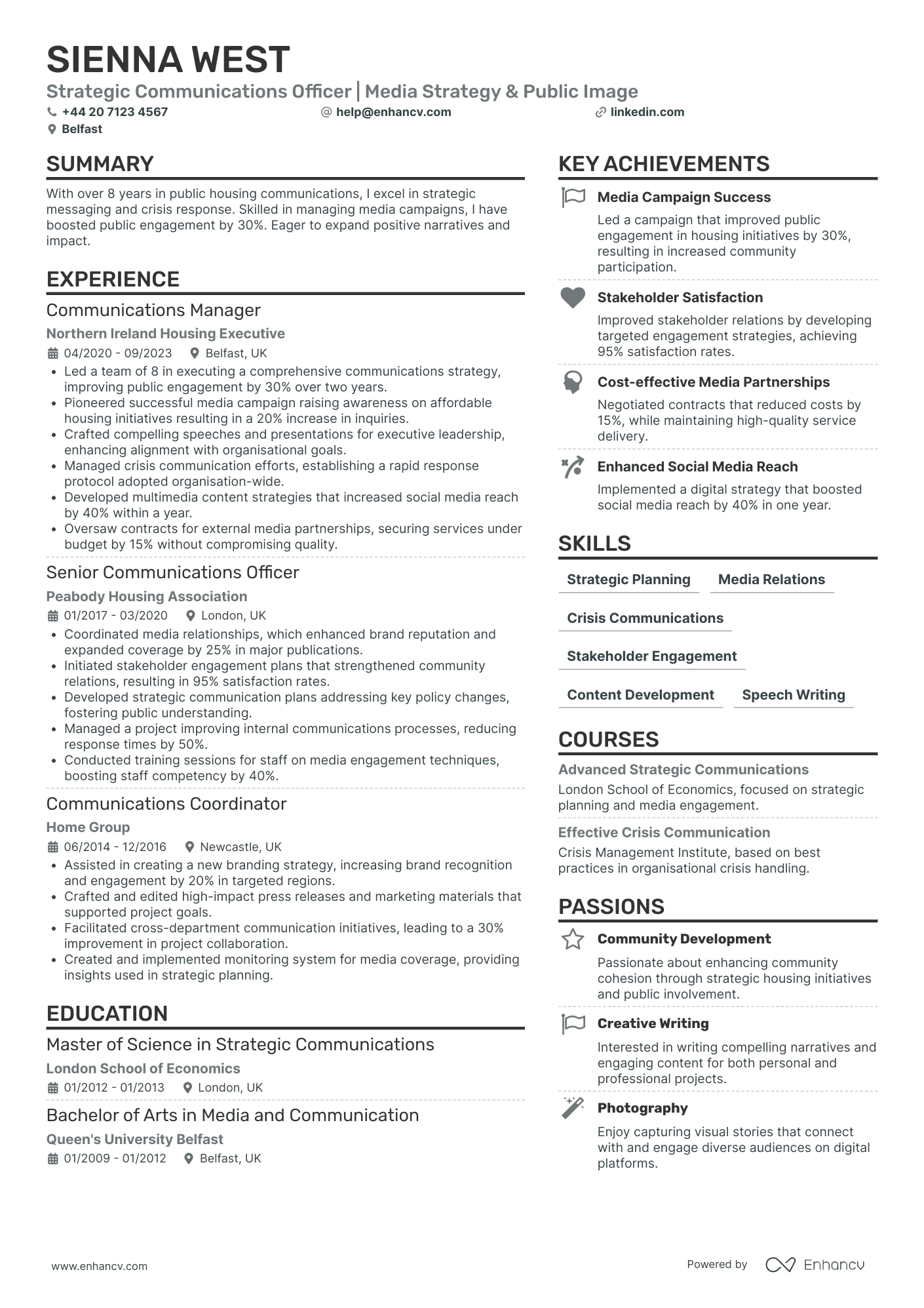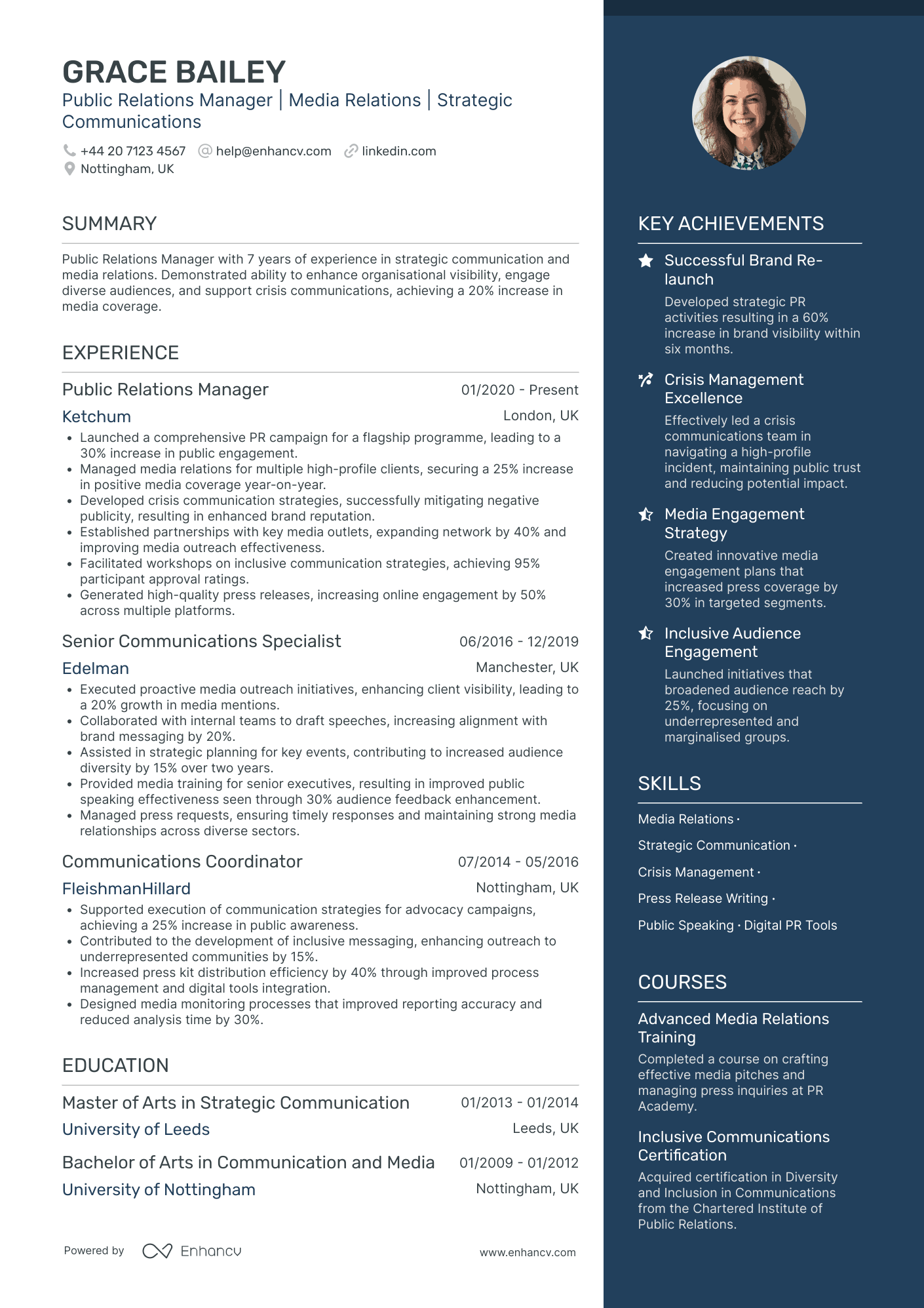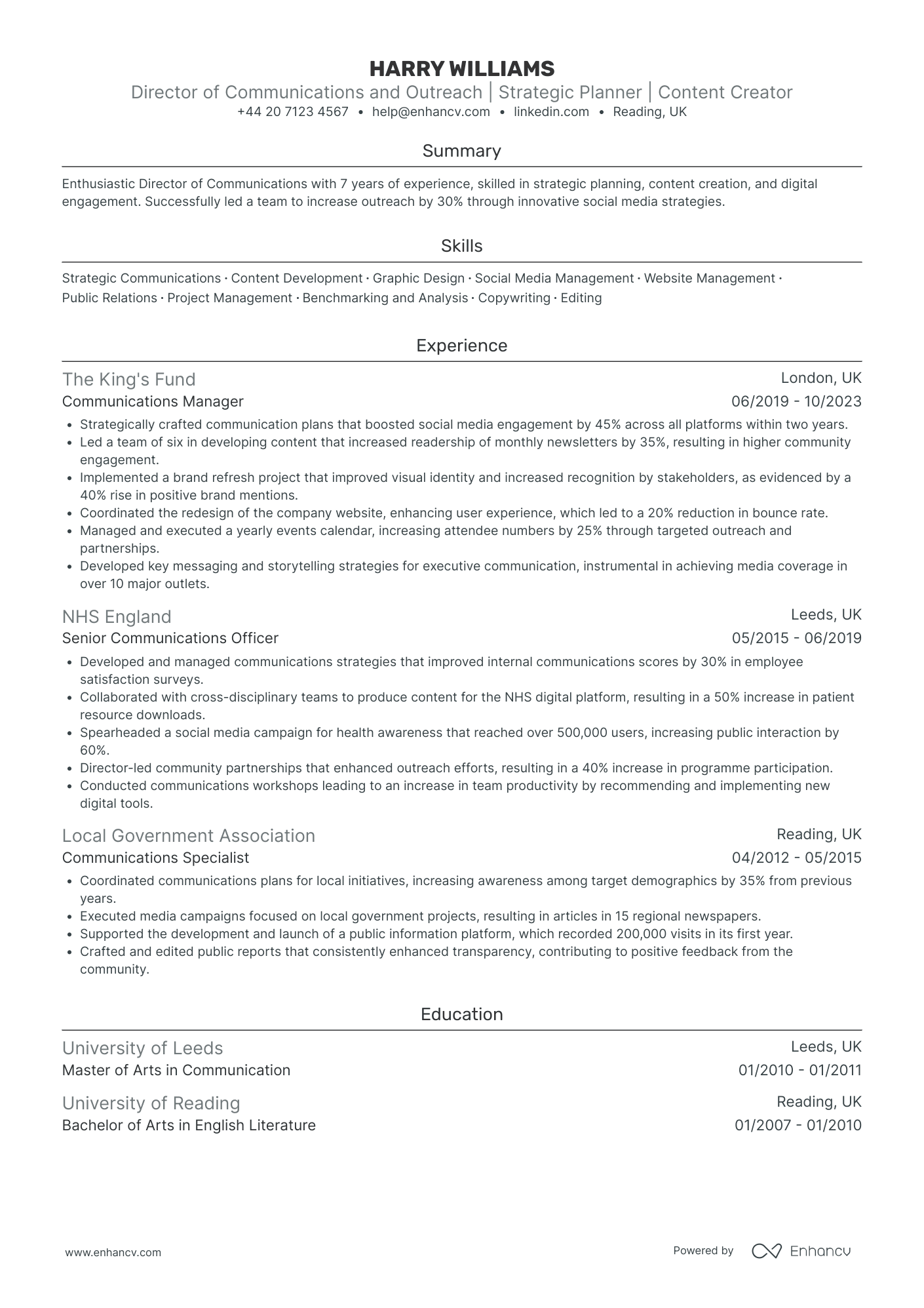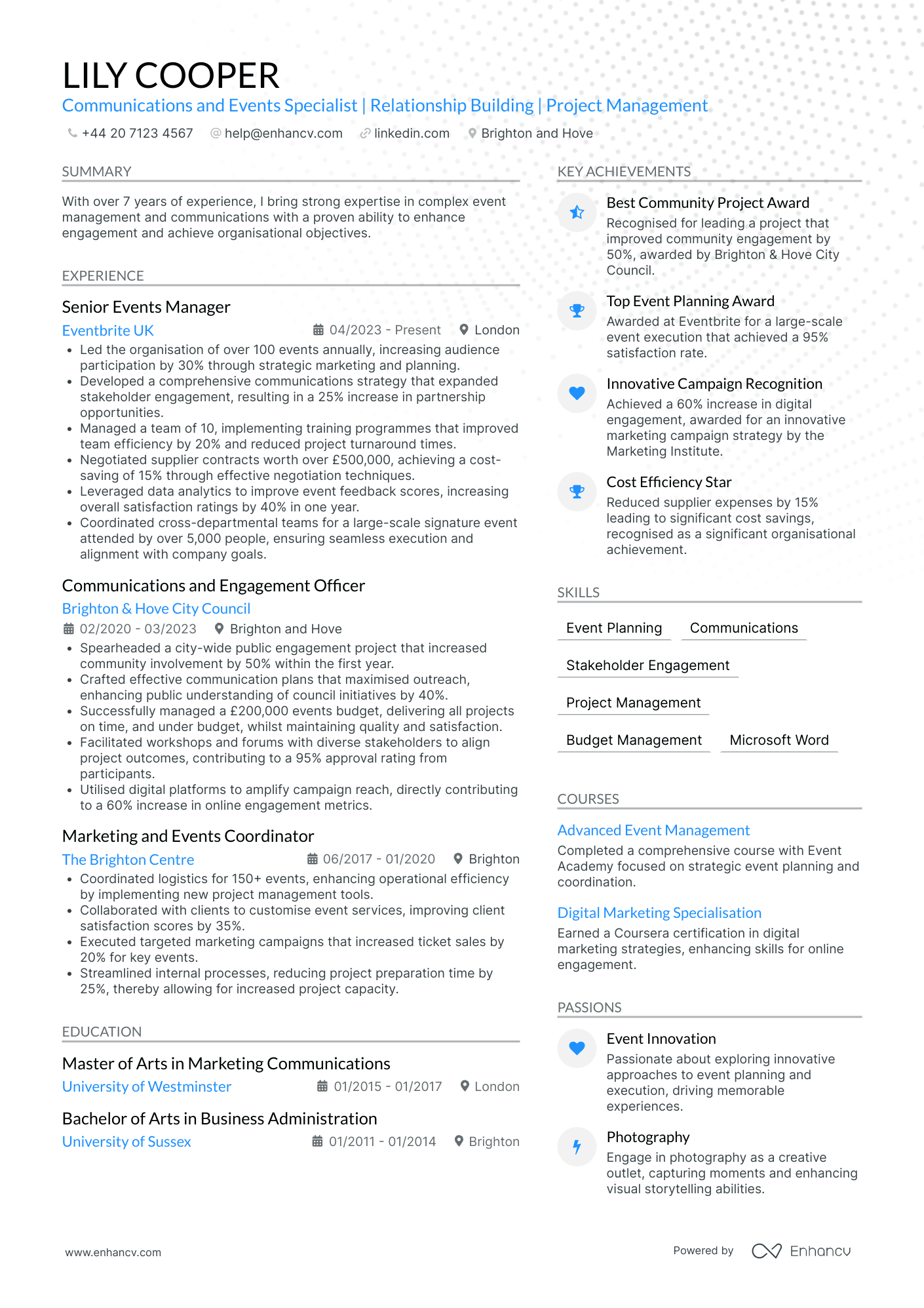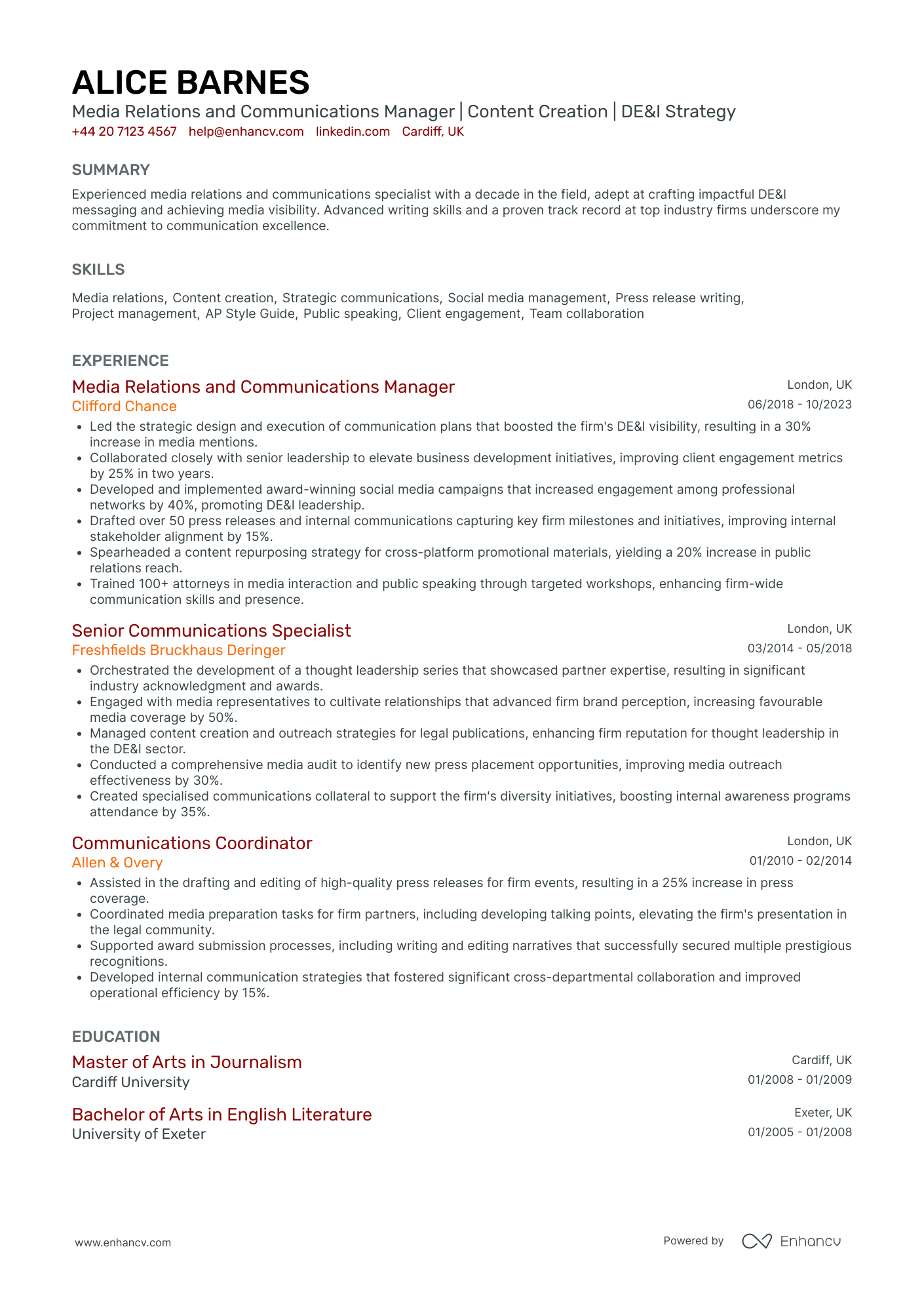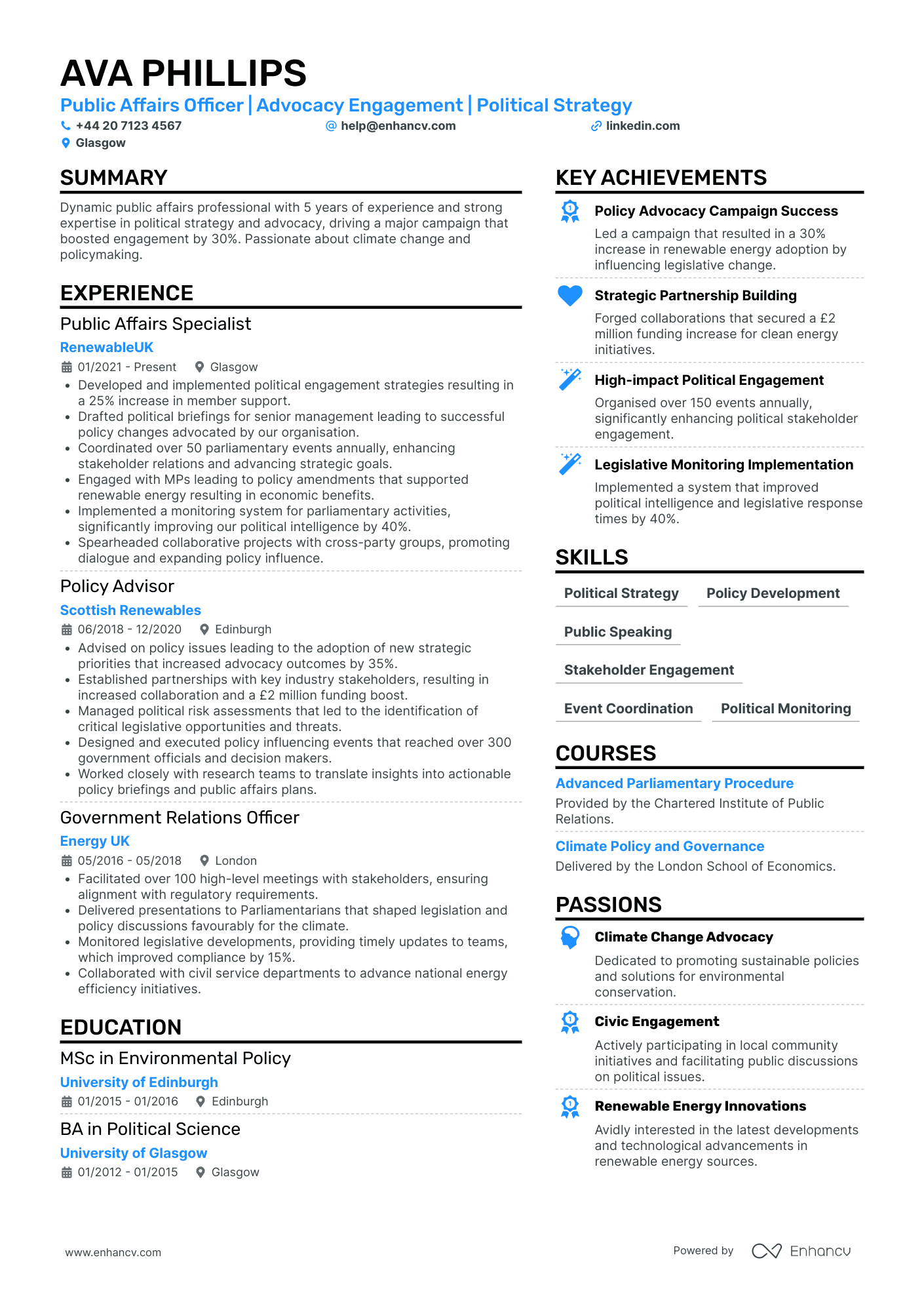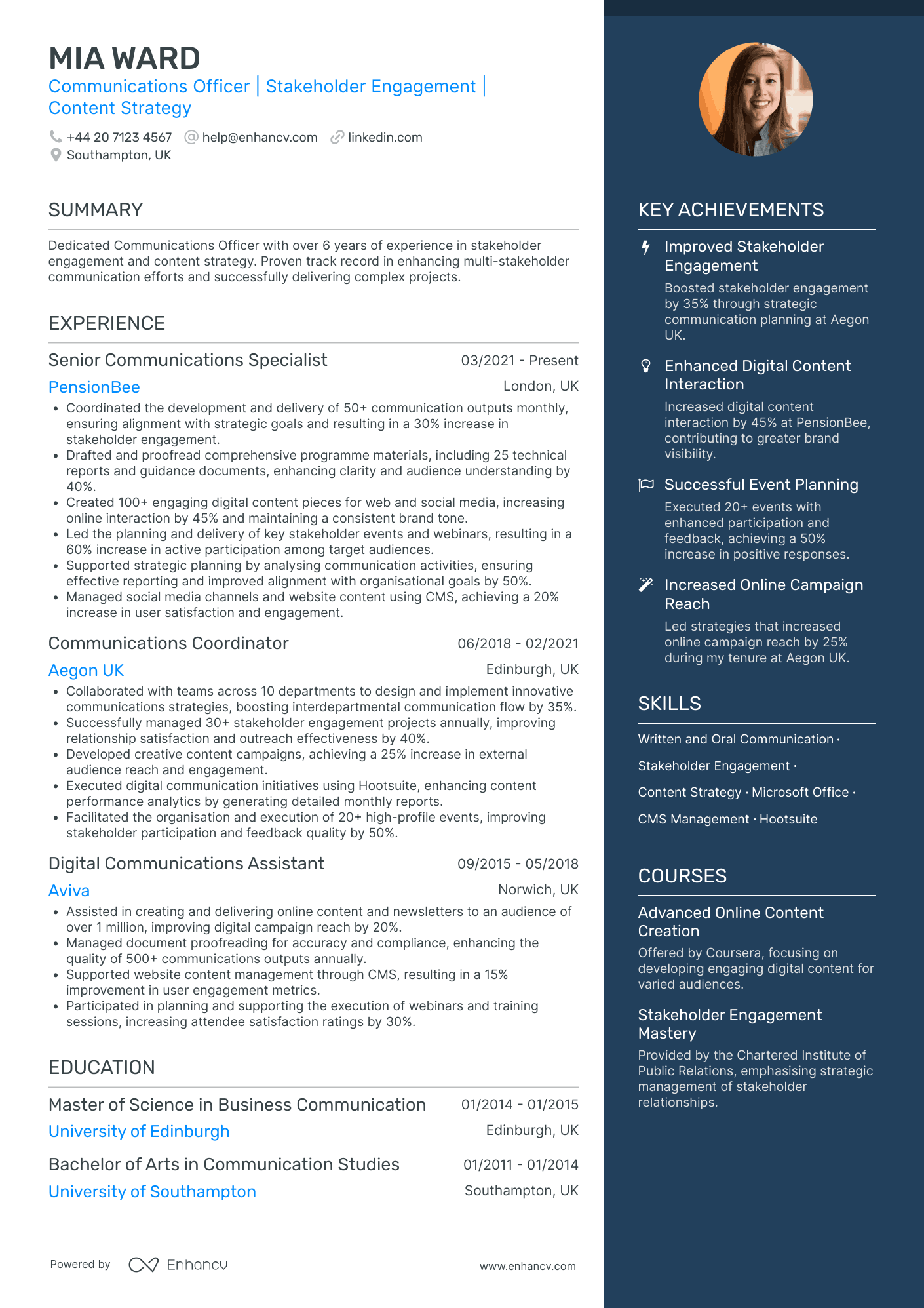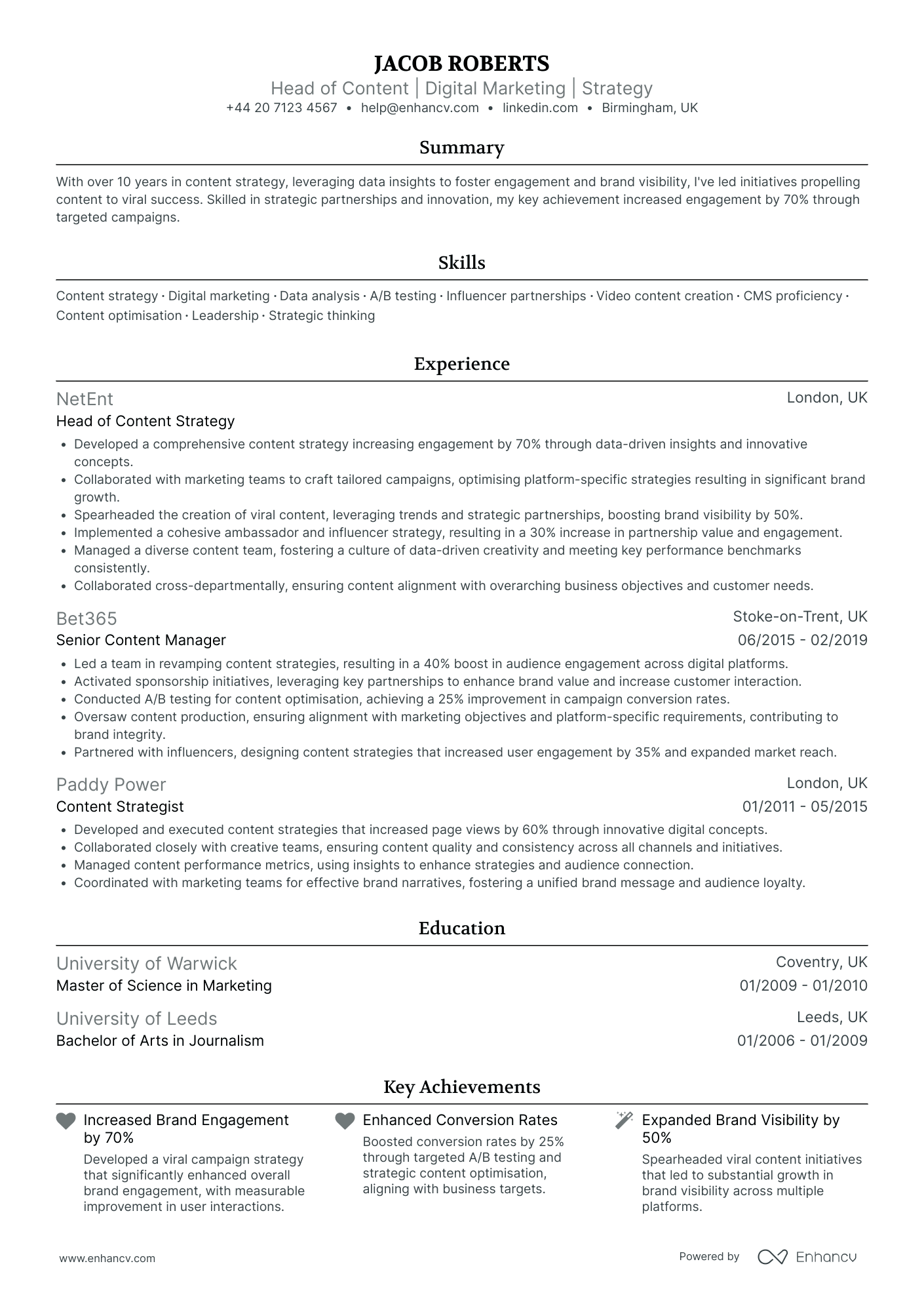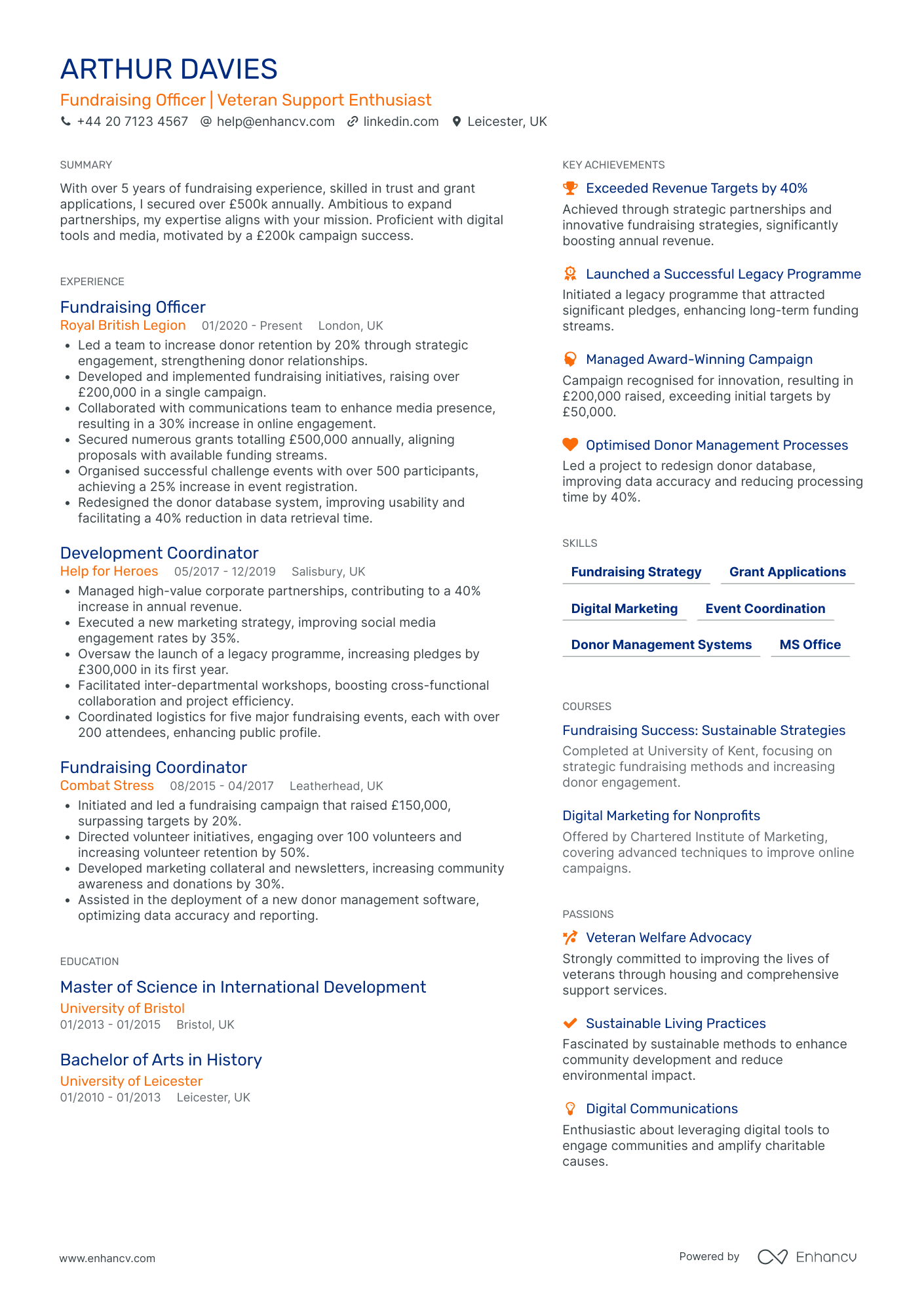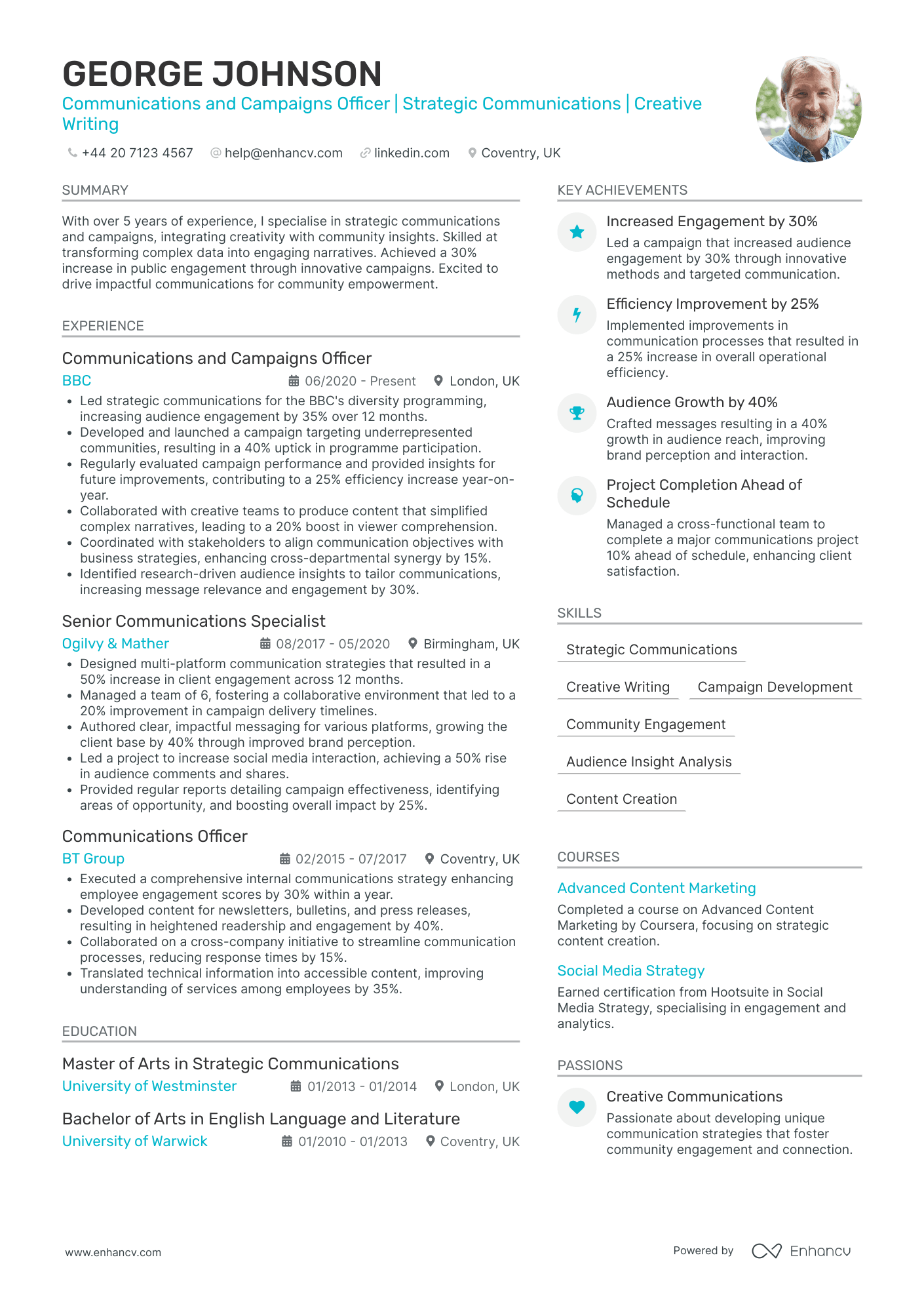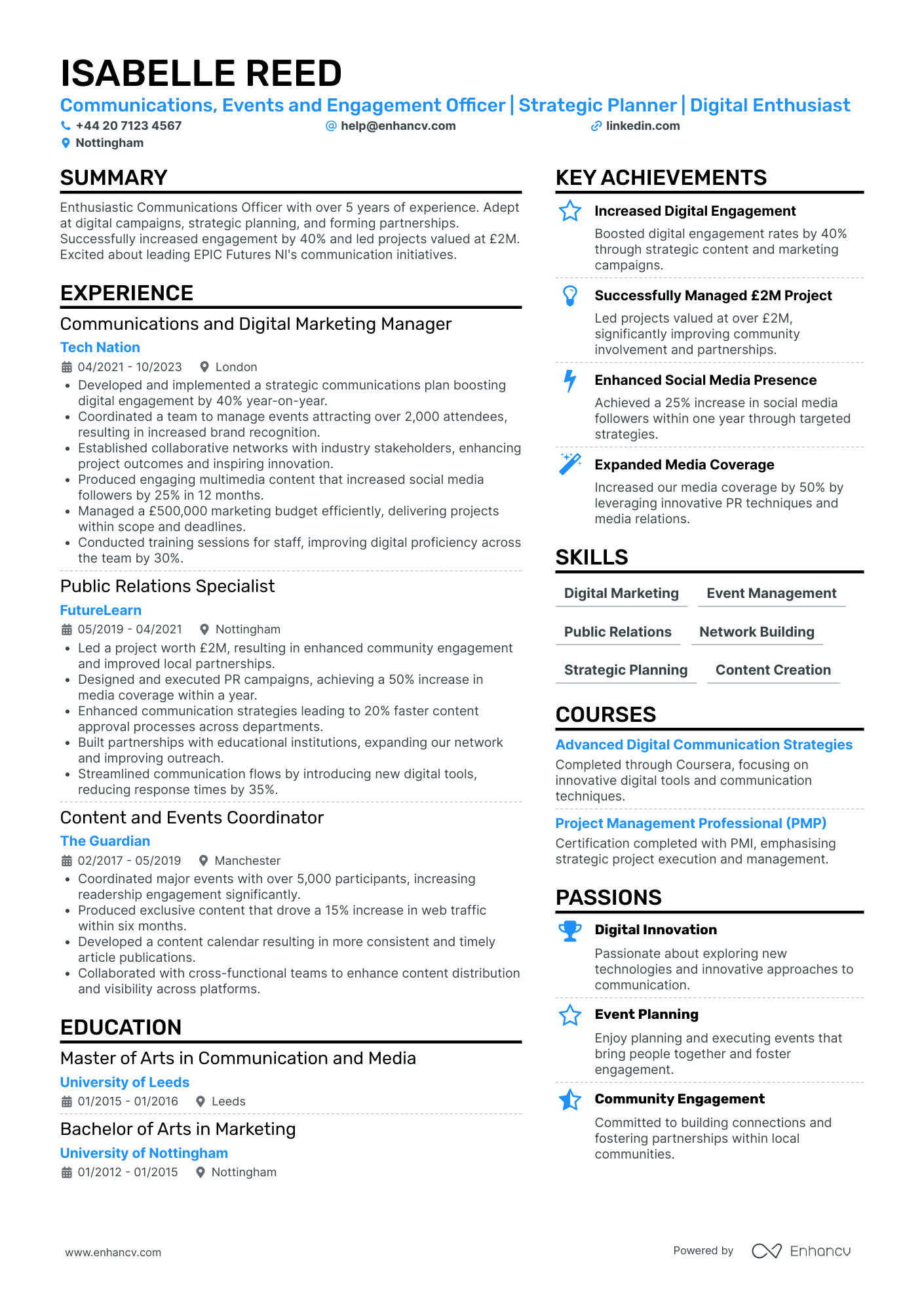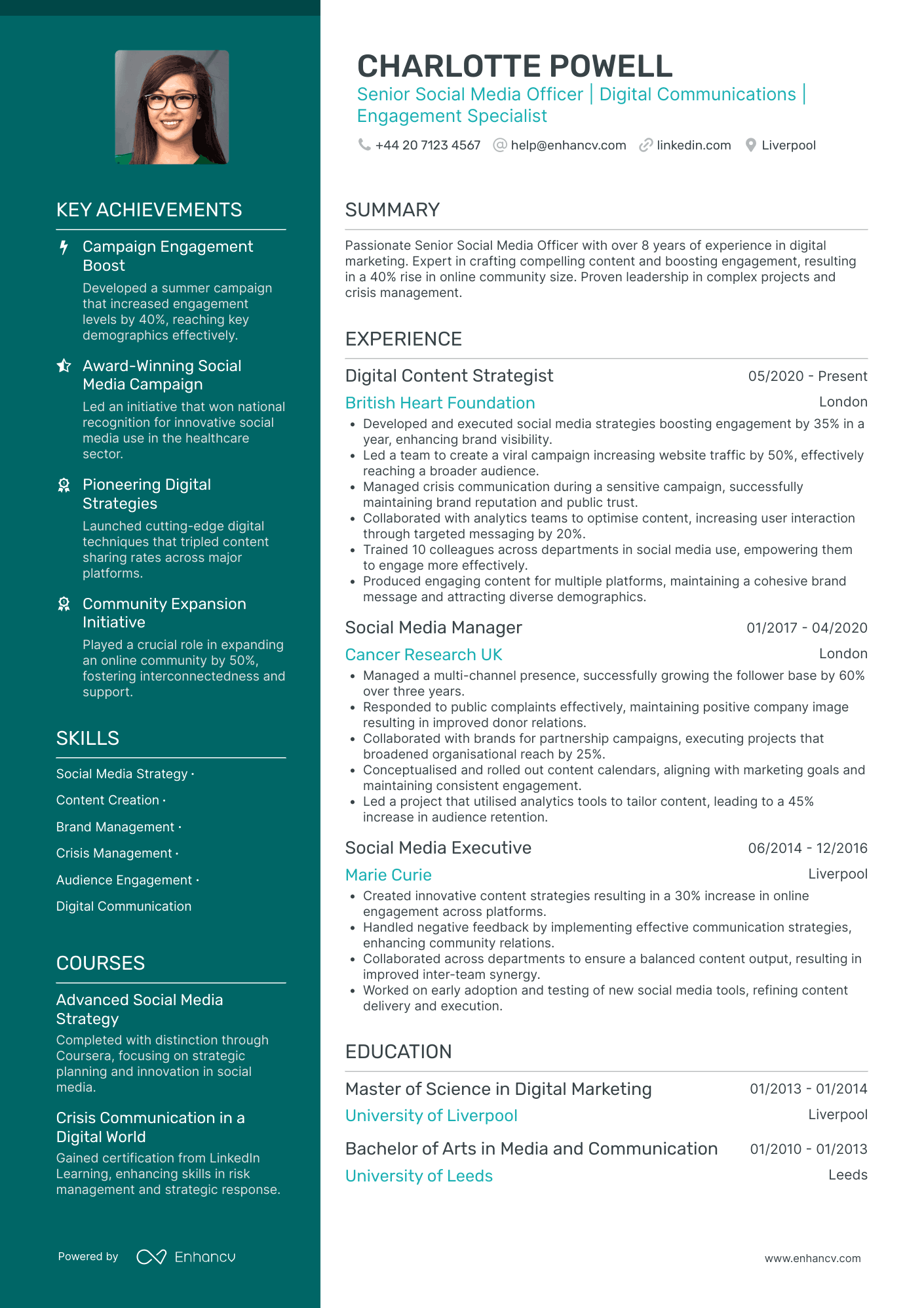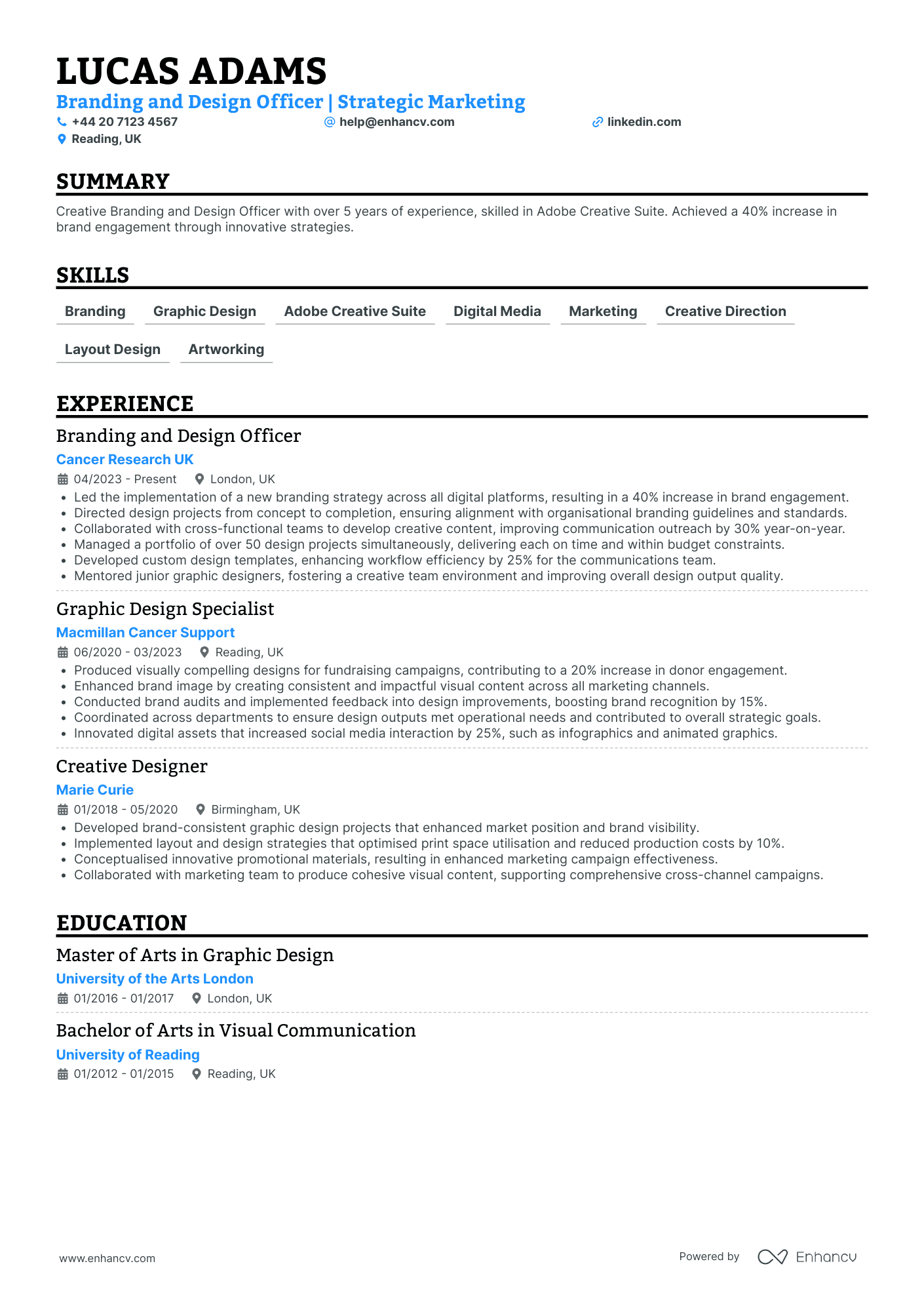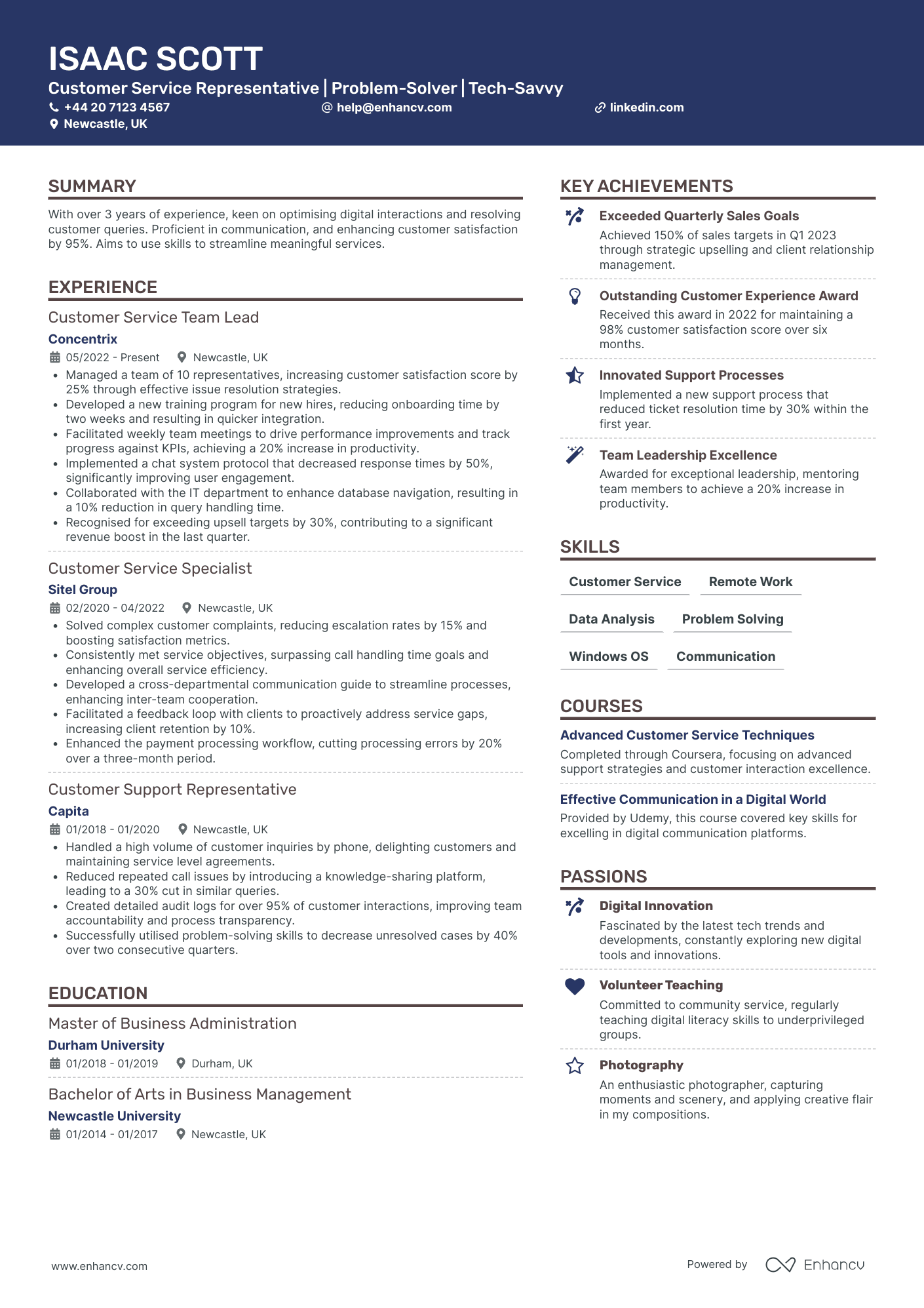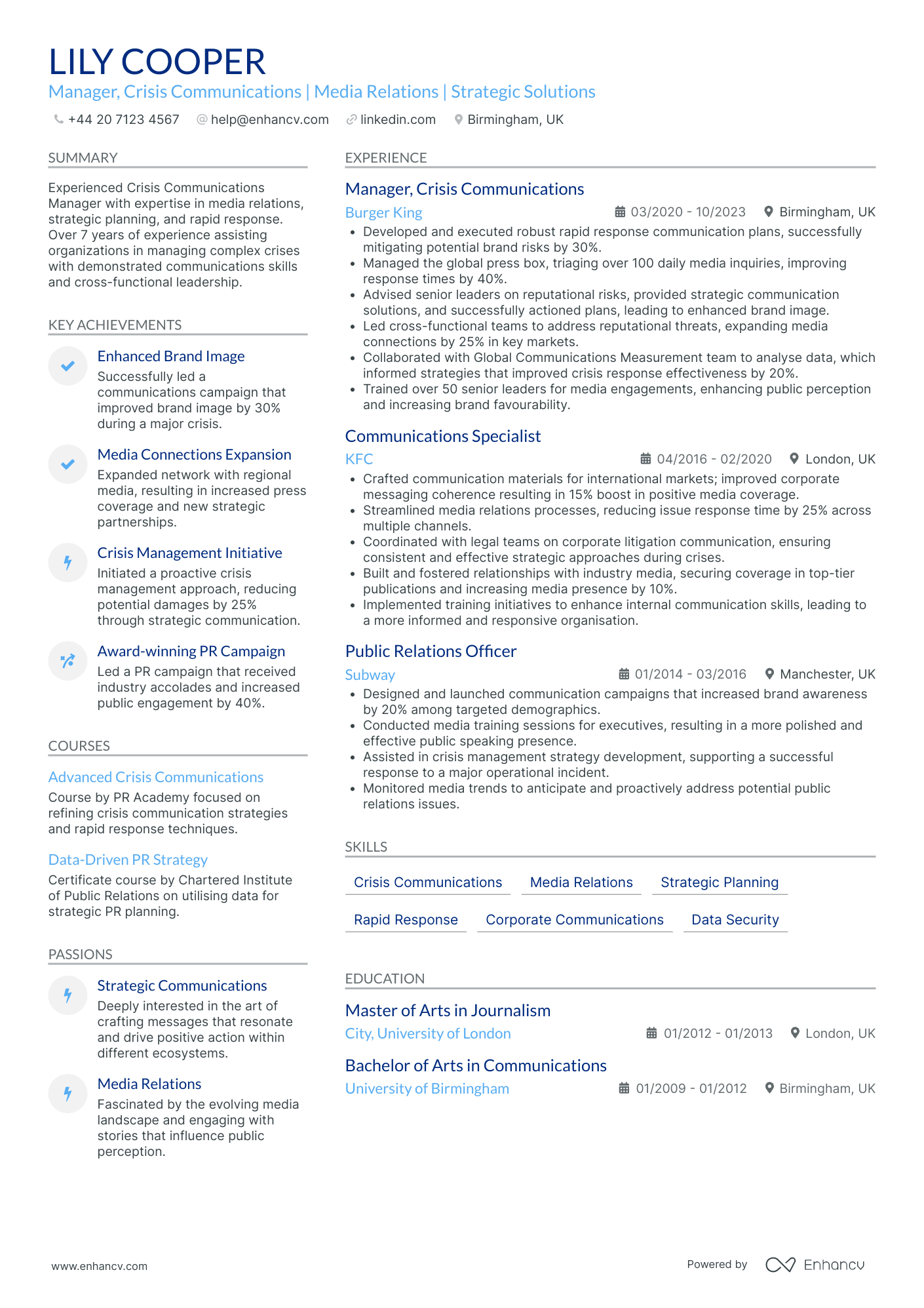Crafting a CV that convincingly showcases your expertise in crafting compelling messages and managing multiple communication channels can be quite perplexing. Our guide offers clear, step-by-step instructions to accentuate your strategic communication skills, ensuring your application stands out to potential employers.
- Applying best practices from real-world examples to ensure your profile always meets recruiters' expectations;
- What to include in your work experience section, apart from your past roles and responsibilities?
- Why are both hard and soft skills important for your application?
- How do you need to format your CV to pass the Applicant Tracker Software (ATS) assessment?
If you're writing your CV for a niche communications officer role, make sure to get some inspiration from professionals:
- Editor CV Example
- Marketing Assistant CV Example
- Marketing Executive CV Example
- Product Marketing Manager CV Example
- Commercial Director CV Example
- Digital Marketing Executive CV Example
- Content Designer CV Example
- Digital Marketing Manager CV Example
- Communication Manager CV Example
- Community Manager CV Example
Resume examples for communications officer
By Experience
Senior Communications Officer
- Highly structured and concise presentation - The CV is well-organized with clear sections that allow for easy navigation, highlighting key experiences such as leadership roles, impactful achievements, and a solid educational background that align with the job title of Senior Communications Officer.
- Strong career progression and leadership - Ruby Gibson's roles illustrate a clear career trajectory from a Marketing and Communications Specialist to a Senior Communications Manager, showcasing her ability to take on greater responsibilities and lead complex communication strategies and successful campaigns across renowned academic institutions.
- Achievements underscore impactful contributions - Each role is supported by quantifiable successes, such as increasing stakeholder engagement by 30%, improving diversity metrics by 25%, and boosting social media interactions by 30%, emphasizing the real-world impact of her strategies and ability to meet critical business objectives.
By Role
Corporate Communications Officer
- Structured and Clear Presentation - The CV is meticulously structured with clearly defined sections that enhance readability. Each section, such as experience, education, skills, and achievements, is logically organized, making it easy to identify key details and understand the candidate’s journey. The concise bullet points under each job role effectively summarize responsibilities and accomplishments without overwhelming the reader, ensuring clarity in communication.
- Consistent Career Growth and Industry Engagement - Jacob’s career trajectory shows a clear path of growth and increasing responsibility, from a Communications Specialist to a Senior Communications Manager. His experience spans reputable and industry-leading companies like BAE Systems and Rolls-Royce, highlighting not only his dedication but also his adaptability within the diverse sectors of technology and engineering. This progression showcases his ability to take on more complex challenges while consistently contributing to his field.
- Comprehensive and Relevant Skill Sets - The candidate demonstrates a strong mix of both hard and soft skills tailored to corporate communications roles. Skills in strategic communications, public relations, and event coordination are complemented by technical proficiency in Microsoft Office Suite and data analysis, providing a holistic toolkit for effective communication strategies. Furthermore, his commitment to ongoing professional development is evident in the completion of advanced courses in strategic planning and public relations, ensuring his methodologies remain current and impactful.
Marketing and Communications Officer
- Career Advancement and Focused Trajectory - Ethan Palmer's CV demonstrates a consistent upward career trajectory from roles in public relations to senior marketing specialist positions, highlighting strategic engagement and stakeholder collaboration within educational institutions. This progression reflects a deepening expertise and commitment to the higher education sector.
- Distinct Achievements with Impact - The CV highlights significant achievements, such as leading rebranding initiatives and launching influencer-driven campaigns that resulted in a notable increase in student applications and engagement. This shows not just success in marketing, but a profound impact on the institutions’ core objectives: student recruitment and brand position.
- Leadership and Interdepartmental Collaboration - Ethan's experience includes managing cross-functional teams and collaborating with various academic departments, showcasing his ability to lead and work across different units. This adaptability is crucial for a role requiring strategic and stakeholder engagement, further supported by skills in facilitating workshops and optimizing SEO campaigns.
Internal Communications Officer
- Strong Presentation of Soft Skills and Leadership - The CV effectively highlights Samuel's leadership qualities and impactful communication skills. His ability to facilitate workshops and initiate feedback campaigns demonstrates his capacity to lead and engage teams, ensuring clear internal communication and staff involvement in projects.
- Impressive Achievements and Impactful Results - The achievements section reveals Samuel's talent for significantly improving organizational outcomes. By driving a 40% increase in intranet engagement and a 30% rise in staff involvement through well-executed strategies, he showcases his ability to deliver results that align with business objectives, enhancing overall staff communication and engagement.
- Adaptability and Cross-Functional Experience - Samuel's varied roles, from volunteering to coordinating communications, illustrate a high degree of adaptability. His experience spans different environments and team structures, demonstrating flexibility and the ability to apply his skills effectively across multiple settings, further expanded by his volunteering experiences, showcasing his community-oriented mindset.
Digital Communications Officer
- Strong Career Progression in Environmental Organizations - Oscar's career trajectory showcases consistent growth within highly regarded conservation-focused organizations. Starting as a Communications Officer at Friends of the Earth, he steadily advanced to a Senior Digital Communications Manager at RSPB, demonstrating his ability to rise through the ranks with increasing responsibility and impact.
- Effective Integration of Analytics and Communication - This CV highlights Oscar's adept use of analytics tools such as Google Analytics to boost digital communication efforts. His utilization of data to optimize digital strategies evidences his ability to enhance campaign reach and engagement, reinforcing the effectiveness of his campaigns with precise, data-driven insights.
- Leadership in Cross-Functional and Interdepartmental Efforts - Oscar's ability to lead cross-departmental collaborations, as seen in his role at RSPB where he aligned digital outputs with organizational goals, showcases his strength in fostering teamwork and enhancing organizational effectiveness. His leadership in developing and mentoring a team further underscores his capability to nurture talent and drive group success.
Strategic Communications Officer
- Strategic Clarity and Structure - The CV offers a clear and concise presentation of Sienna West's professional journey, providing a structured view of her career progression along with her core competencies in strategic communications and media strategy.
- Career Advancement and Leadership Growth - Sienna's career trajectory illustrates steady growth from a Communications Coordinator to a Communications Manager, reflecting a significant rise in responsibilities and leadership roles within the housing sector, which underscores her capability to manage complex projects and teams effectively.
- Significant Achievements with Business Impact - The document effectively highlights key achievements such as improving public engagement by 30% through media campaigns and reducing costs by 15% in media partnerships, clearly demonstrating her impact on organizational efficiency and community participation.
Public Relations and Communications Officer
- Structured clarity and concise presentation - The CV is well-organized, with clear headers and concise bullet points that efficiently convey the candidate's experience and achievements. This structured approach allows easy navigation for hiring managers to quickly identify relevant information and understand the candidate's qualifications.
- Impressive career growth and industry presence - Grace Bailey’s career trajectory demonstrates a strong upward movement through progressively more responsible roles in prestigious companies like Ketchum and Edelman. This advancement indicates a robust track record of success and adaptability within the competitive field of public relations, highlighting her as a driven and ambitious professional.
- Achievement-focused with strategic impact - The CV effectively highlights not just numerical successes but also the strategic impact of Grace’s contributions, such as the increase in media engagement and enhanced brand visibility. By emphasizing the broader business relevance of her achievements, the CV illustrates Grace's ability to contribute meaningfully to organizational goals, transcending mere quantitative metrics.
Communications and Outreach Officer
- Career Growth and Leadership Progression - The CV showcases a robust career trajectory, with progressive roles from Communications Specialist to Director of Communications and Outreach. This advancement highlights strong leadership and a strategic mindset, underscoring the candidate’s ability to manage key projects and drive team success. Each role reflects increased responsibilities and a growing impact in both scope and scale.
- Effective Content Presentation and Structure - The document is meticulously organized, and each section is presented with clarity and brevity. The use of bullet points effectively highlights achievements and competencies, making it easy for the reader to digest major milestones and skills. Concise descriptions ensure a focused and impactful presentation without overwhelming the reader.
- Integration of Industry-Specific Skills - The inclusion of unique industry-specific skills such as strategic communications, digital tool implementation, and brand identity rejuvenation reflects a deep understanding of critical communication disciplines. These elements, paired with the use of effective methodologies like storytelling strategies, enhance the candidate’s technical depth and relevance in communication planning and execution.
Communications and Events Officer
- Strategic and Effective Content Presentation - The CV is structured in a clear and concise manner, presenting information in a logical sequence that allows the reader to quickly grasp Lily’s extensive background. Key sections such as experience, education, skills, and achievements are prominently displayed, which helps in efficiently communicating her professional standing and qualifications.
- Impressive Career Growth and Industry Versatility - Spanning roles from a Marketing and Events Coordinator to a Senior Events Manager, Lily’s career trajectory is marked by significant professional growth and adaptability within the events and communication industries. This demonstrates her ability to take on increased responsibilities and leverage experiences across different sectors, including local government and private companies.
- Achievements with Significant Business Impact - The CV emphasizes achievements that not only showcase Lily's capabilities but also their business relevance. The documented improvements, such as a 30% increase in audience participation and a 40% enhancement in satisfaction ratings, affirm her ability to drive successful outcomes in the organizations she has worked with, underscoring her value as a business asset.
Communications and Media Relations Officer
- Structured Career Advancement - Alice Barnes' CV outlines a clear progression in her career within top law firms, moving from a Communications Coordinator to a Manager role, showing increasing levels of responsibility and leadership in her field.
- Impactful DE&I and Media Initiatives - The achievements highlighted in the CV, such as the award-winning DE&I Initiative Campaign and increased media mentions, demonstrate her ability to not only develop strategies but also to execute them successfully, leading to measurable improvements in brand visibility and DE&I engagement.
- Diverse Skill Set and Continuous Learning - The inclusion of skills such as strategic communications, public speaking, and project management, along with completed courses in advanced media relations and DE&I strategies, indicates a dedication to professional development and adaptability to the evolving media landscape.
Communications and Public Affairs Officer
- Clear Career Advancement - The CV outlines a strong career trajectory, showing a logical progression from a Government Relations Officer to a Public Affairs Specialist. This growth is evidenced by increasingly significant responsibilities and achievements, effectively demonstrating Ava Phillips’ commitment to the field and her ability to take on greater challenges over time.
- Strategic Impact in Achievements - Ava’s achievements are not just listed numerically but are explained with relevant business impact, such as leading a campaign that increased renewable energy adoption by 30%. These achievements are thoughtfully described to highlight their significance in advancing organizational goals, suggesting a results-oriented professional.
- Emphasis on Cross-Functional Skills - The CV highlights Ava’s adaptability and cross-functional experience by showcasing her roles across different aspects of public affairs and policy advising. It reflects her capability to engage with various stakeholders, from MPs to industry partners, and navigate complex political landscapes efficiently and effectively.
Communications and Stakeholder Engagement Officer
- Strategic Communication Focus - The CV demonstrates a strong emphasis on strategic communication and stakeholder engagement, highlighting the candidate's ability to enhance relationships and deliver complex projects effectively. This focus is crucial for a Communications Officer tasked with managing diverse communication needs.
- Career Growth and Industry Experience - Over the course of over six years, the candidate has progressed from a Digital Communications Assistant to a Senior Communications Specialist. This clear upward trajectory indicates their professional growth and deepening expertise in communications and content strategy, spanning notable companies like Aviva, Aegon UK, and PensionBee.
- Tool Proficiency and Methodological Expertise - The CV details the candidate's expertise in using industry-specific tools such as CMS and Hootsuite, vital for digital content management and performance analytics. Additionally, courses in advanced online content creation and stakeholder engagement mastery further underscore the candidate's technical depth and commitment to professional development.
Communications and Online Content Officer
- Effective Content Presentation - The CV presents information with remarkable clarity and structure, using bullet points that facilitate easy reading. The comprehensive sections are concise yet informative, allowing quick absorption of impressive career details and achievements.
- Notable Career Trajectory - The CV traces a clear and upward career trajectory, demonstrating significant growth from Content Strategist to Head of Content Strategy. It highlights strategic promotions, reflecting the candidate's increasing responsibilities and expertise in digital marketing and content creation.
- Impactful Achievements and Relevance - Focus is given to achievements with clear business impact, such as increasing brand engagement by 70% and enhancing partnership value by 30%. These measurable outcomes demonstrate the candidate's ability to align content strategies with business objectives, driving real-world results.
Communications and Fundraising Officer
- Emphasizes Proven Fundraising Success - The CV effectively highlights Arthur's achievements in fundraising through concrete figures, such as generating over £500k annually and leading a successful £200k campaign. This not only underscores his ability to secure significant funding but also highlights a consistent record of delivering results in financial growth for charitable organizations.
- Showcases Leadership and Team Building Skills - Arthur's role as a Fundraising Officer involves leading teams and executing strategic initiatives, which is evident through key responsibilities such as increasing donor retention by 20% and facilitating cross-departmental workshops. His experience showcases his capacity to inspire and manage groups, driving both team performance and organizational success.
- Demonstrates Industry-Specific Expertise with Tools and Methods - The CV showcases Arthur's adeptness with digital tools and donor management systems, emphasizing his technical skills in managing databases and social media, which are critical for modern fundraising. His ability to redesign donor systems, improve engagement through media collaboration, and optimize processing demonstrates an advanced understanding of industry-specific tools.
Communications and Campaigns Officer
- Effective Content Presentation - George Johnson's CV is meticulously structured, allowing for a clear and concise presentation of his career achievements and skills. Each section is delineated with precise headings, and the use of bullet points enhances readability, ensuring that his accomplishments are easily digestible at a glance.
- Impressive Career Trajectory - Johnson's career trajectory demonstrates a dynamic rise through roles with increasing responsibility and prominence in the communications field. Transitioning from a Communications Officer at BT Group to a senior role at Ogilvy & Mather and then to a key position at the BBC underscores a robust career development marked by promotions and enriched experiences.
- Strategic Use of Industry Tools and Methodologies - The CV highlights George's strategic use of audience insight analysis and report generation, effectively utilizing these methodologies to boost engagement and operational efficiency. His ability to integrate complex data into compelling narratives exemplifies a high level of technical depth required for impactful communications.
Communications and Engagement Officer
- Clear and Targeted Content Structure - Isabelle's CV is structured meticulously, facilitating quick comprehension of her qualifications. The header provides immediate access to essential contact information, while consistent formatting across job experiences highlights key accomplishments. This clarity ensures her capabilities are conveyed effectively.
- Dynamic Career Trajectory - Isabelle's career shows significant growth, moving from a Content and Events Coordinator to a Communications and Digital Marketing Manager. This progression demonstrates her ability to take on increased responsibilities and effectively adapt to diverse roles within the communications sector.
- Impact-Driven Achievements - Her CV emphasizes significant achievements with a business impact, such as increasing engagement by 40% and managing a £2M project. These highlights not only quantify her contributions but also underline her capacity to drive substantial value for her employers through strategic initiatives.
Communications and Social Media Officer
- Clear Career Progression - The CV illustrates a solid career trajectory, showing steady growth from a Social Media Executive to a Senior Social Media Officer. Charlotte Powell’s promotions reflect increasing responsibility and oversight, showcasing her dedication and upward mobility within reputable organizations in the non-profit sector.
- Industry-Specific Expertise - Charlotte's profile is rich with industry-specific skills such as crisis management and digital communication strategies, showcasing her deep expertise in handling public image and collaborative campaigns. Her training in social media usage and analytics-driven content optimization highlights her ability to leverage technical tools for strategic outcomes, a necessity in digital communications roles.
- Impactful Achievements - The achievements section goes beyond numbers, detailing the significant impact of Charlotte's work with phrases such as "boosting engagement by 35%" and leading a "viral campaign increasing website traffic by 50%." These accomplishments underscore her ability to translate social media efforts into measurable results, driving business growth and brand expansion in the health advocacy sector.
Communications and Branding Officer
- Structured and Clear Presentation - The CV is neatly structured, with well-defined sections such as experience, education, skills, and achievements that make it easy to navigate. The conciseness of each section, paired with bullet points, allows for quick scanning while still conveying essential information about the candidate's qualifications and accomplishments.
- Demonstrated Career Growth - Lucas’ career trajectory displays a clear progression from a Creative Designer to a Branding and Design Officer in reputable organizations. This upward movement highlights his growth in responsibility and influence, reflecting his capability to take on more strategic roles within the industry.
- Strategically Impactful Achievements - The achievements are not merely numerical; they narrate Lucas’ ability to drive substantial business impact. For example, the 40% increase in brand engagement showcases his strategic acumen and effective execution, illustrating not just what he accomplished, but its long-term value to the organizations he served.
Communications and Customer Service Officer
- Structured career advancement – The candidate displays a clear progression from Customer Support Representative to Customer Service Team Lead in just under five years, demonstrating rapid professional growth and a track record of success in leadership roles. This highlights their ability to quickly adapt to increasing responsibilities and excel in more demanding positions.
- Integration of soft skills in leadership – The CV emphasizes Isaac's proficiency in essential soft skills such as communication, organisation, and problem-solving, which are crucial in delivering exceptional customer service and driving team success. Their leadership capabilities are further validated by their achievements in enhancing productivity and mentoring team members.
- Emphasizing track record of impactful achievements – By strategically highlighting achievements like exceeding sales goals by 150% and receiving awards for outstanding customer experience, the CV effectively illustrates the candidate's ability to generate significant business impact. These accomplishments serve as powerful endorsements of their capability to meet and surpass business objectives.
Communications and Crisis Management Officer
- Clarity and Conciseness in Presentation - The CV is structured in a clear and logical format that effectively communicates the candidate's wealth of experience in crisis communications. Each section is concise, providing the essential information without unnecessary detail, which makes it easy for hiring managers to quickly assess the candidate's suitability for a managerial role in crisis communications and media relations.
- Impressive Career Trajectory - Lily Cooper's career progression from a Public Relations Officer to a Manager of Crisis Communications illustrates consistent growth and increasing responsibilities. This trajectory showcases her ability to advance within major corporations such as Burger King, KFC, and Subway, reflecting her capability to take on more complex challenges and demonstrate leadership qualities across different roles and organizations.
- Strategic Approach in Achievements - The CV highlights significant achievements that demonstrate Lily's strategic impact on the organizations she worked with. For instance, the development of communication plans that mitigated brand risks by 30% and her role in enhancing brand image during crises underscore her capacity to deliver meaningful business results beyond mere statistics, showcasing strategic thought leadership.
Formatting your communications officer CV to meet the role expectations
Staring at the blank page for hours on end, you still have no idea how you should start your professional communications officer CV. Should you include more colours, two columns, and which sections? What you should remember about your CV format is this - ensure it's minimalistic and doesn't go over the top with fancy fonts and many colours. Instead, focus on writing consistent content that actually answers the job requirements. But, how about the design itself :
- Use the reverse chronological order to showcase your experience, starting with your most recent role;
- Include your contact details (email address, phone number, and location) - and potentially your professional photo - in the header;
- Must-have CV sections include summary or objective, experience, education, and skills: curate the ones that fit your profile;
- Your professional communications officer CV should be between one-to-two pages long: select the longer format if you have more experience.
A little bit more about your actual CV design, ensure you're using:
- plenty of serif or sans serif font (e.g. Montserrat, Exo 2, Volkhov) as they are Applicant Tracker System (ATS) compliant. Avoid the likes of Arial and Times New Roman because most candidates' CVs are in this typography.
When submitting your CV, are you still not sure what format it should be? Despite the myth that has been circling around, most modern ATS systems are perfectly capable of reading PDFs. This format is an excellent choice as it keeps all of your information intact.
PRO TIP
Incorporate a touch of colour in headers or section breaks, but keep it professional and ensure it doesn’t detract from readability, especially in more conservative industries.
The top sections on a communications officer CV
- Contact Information ensures the recruiter can reach you easily.
- Professional Summary highlights your career and skills overview.
- Communications Experience showcases your relevant job history.
- Key Skills section reflects specific abilities in communications.
- Education and Qualifications demonstrate your foundational knowledge.
What recruiters value on your CV:
- Highlight your experience in managing various communication channels, emphasising your ability to craft compelling content for social media, press releases, and internal communications that align with organisational goals.
- Illustrate your expertise in crisis management with examples of past situations where you effectively navigated and mitigated issues through strategic communication planning.
- Demonstrate your skills in building and maintaining relationships by showcasing past work where you have effectively engaged with stakeholders, media, and the public to enhance the organisation's image and objectives.
- Detail your proficiency with digital communication tools and analytics platforms, including your ability to interpret data to improve engagement strategies and measure the success of communication campaigns.
- Present a portfolio of your work or case studies that exhibit your creativity and impact in previous communications roles, spotlighting campaigns that you have successfully developed and executed from conception to completion.
Recommended reads:
What information should you include in your communications officer CV header?
The CV header is potentially the section that recruiters would refer to the most, as it should include your:
- Contact details - your professional (non-work) email address and phone number;
- Professional photograph - if you're applying hinting at the value you bring as a professional.
Many professionals often struggle with writing their communications officer CV headline. That's why in the next section of this guide, we've curated examples of how you can optimise this space to pass any form of assessment.
Examples of good CV headlines for communications officer:
- Lead Corporate Communications Manager | Strategic Brand Messaging | CIPR Certified | 10+ Years' Experience
- PR & Media Relations Officer | Content Creation | Crisis Management Expert | 5 Years in Field
- Internal Communications Specialist | Employee Engagement | Digital Communications | Masters in Communication | 7 Years
- Social Media Coordinator | Audience Growth | SEO & Analytics | CIM Diploma | 3 Years Professional
- Senior Communications Advisor | Policy Advocacy | Stakeholder Outreach | Bachelors in Journalism | 15+ Years
- Junior Communications Executive | Multichannel Campaigns | Press Release Writing | BA Hons PR | 2-Year Experience
Choosing your opening statement: a communications officer CV summary or objective
At the top one third of your CV, you have the chance to make a more personable impression on recruiters by selecting between:
- Summary - or those three to five sentences that you use to show your greatest achievements. Use the CV summary if you happen to have plenty of relevant experience and wish to highlight your greatest successes;
- Objective - provides you with up to five sentences to state your professional aims and mission in the company you're applying for
CV summaries for a communications officer job:
- With over 5 years of dedicated experience in strategic communication within the tech sector, I possess expertise in digital content creation, brand management, and social media outreach, evidenced by leading a campaign that increased online engagement by 50% for a major software company.
- Seasoned professional with a decade of experience in PR, specialised in crisis management and corporate communication for a multinational corporation; adept in press release composition and media relations, with a significant track record of successfully managed high-profile PR incidents.
- Eager to transfer my 7 years of experience as an Environmental Lawyer into a dynamic communication position; proficient in complex information translation, public speaking, and stakeholder engagement, aiming to leverage my advocacy skills to effectively articulate sustainability initiatives.
- Seeking a shift into communications after 8 years in financial analysis; highly skilled in delivering data-driven insights and crafting clear narratives to diverse audiences, with a goal to excel in conveying compelling messages that enhance corporate transparency and investor relations.
- Keen to apply a fresh perspective to communication strategies, armed with a BA in Marketing and robust public speaking credentials; eager to absorb industry knowledge and contribute to creating impactful messaging that aligns with strategic organisational goals.
- Embarking on a communications career path, I bring forth a Master’s in Journalism and a passion for storytelling; I am zealous about contributing to a team dedicated to informing and engaging the public through innovative communication tactics and expertly crafted narratives.
How to meet job requirements with your communications officer CV experience
We've now reached the essence of your actual CV - your experience section. This is the space where you can list your career roles and on-the-job successes. Many candidates tend to underestimate just how much time and effort they should put into writing this CV section. Your experience shouldn't be a random list of your responsibilities, but instead:
- Match the job description with your skills, values, and accomplishments;
- Start each bullet with a strong action verb, followed up with one key skill and your outcome of applying this skill;
- Spotlight parts of your career history that are relevant to the job you're applying for.
Before we move on, make sure to check out some professional CV experience sections.
Best practices for your CV's work experience section
- Developed and implemented an integrated communications strategy, incorporating PR, marketing, and online tactics, that resulted in a 20% increase in brand awareness within one fiscal year.
- Managed a team of communication specialists, overseeing the creation of press releases, social media content, and official statements, while ensuring messaging aligned with organisational goals.
- Administered the organisation's crisis communication plan, minimising negative exposure and effectively handling sensitive issues with tact and professionalism.
- Orchestrated a successful social media campaign that boosted follower engagement by 30% and was recognised with an industry award for innovation in digital communication.
- Led the internal communications initiatives, improving employee engagement scores by 15% through targeted campaigns, town hall meetings, and an intranet content revival.
- Monitored media coverage and industry trends to proactively pitch stories to journalists, securing an average of 10 high-profile media placements per month.
- Collaborated with marketing to create compelling advertising campaigns, aligning with event promotions and product launches, which resulted in a 25% increase in lead generation.
- Conducted media training for senior executives and spokespeople, significantly enhancing their communication skills and effectiveness in public speaking engagements.
- Evaluated and optimised communication channels and tools through analytics and feedback, achieving a more efficient reach and impact with target audiences.
- Developed and implemented an innovative social media strategy that increased the organisation's online presence by 40% within six months, enhancing customer engagement.
- Spearheaded the creation of a crisis communication plan that effectively managed three major incidents, minimising negative press coverage and preserving the company's reputation.
- Orchestrated a collaborative partnership with the marketing department, resulting in a 25% increase in campaign efficiency and a unified brand message across platforms.
- Initiated a comprehensive communications audit, which identified key areas for improvement and informed the redevelopment of internal communication channels.
- Successfully managed the public relations aspect of a major product launch, leading to a 35% rise in sales and significant media coverage.
- Delivered a company-wide training program on best practices for external communications ensuring consistency in messaging across departments.
- Crafted and disseminated press releases that resulted in an average of 50 pieces of media coverage per release, enhancing company's industry authority.
- Led a team of 5 junior communications specialists, ensuring effective collaboration in campaigns that led to a 30% increase in public engagement for health initiatives.
- Negotiated with external vendors for media buying, which reduced costs by 20% while maintaining reach and frequency of advertisement placements.
- Launched an inter-departmental newsletter that improved company-wide communication and was recognized by the CEO for its effectiveness.
- Analysed engagement metrics to adjust communication strategies, which led to a 15% improvement in employee satisfaction scores.
- Managed the communications component of a merger, ensuring timely and transparent communication to stakeholders and preventing stock price volatility.
- Introduced a new digital communication platform that increased efficiency and streamlined the company's workflow, contributing to a 10% savings in annual communication costs.
- Led a communications team across multiple countries, coordinating global campaigns that increased brand recognition in new markets by 17%.
- Designed and executed a targeted stakeholder engagement strategy that successfully onboarded 300 new investors for company's funding round.
- Played a key role in coordinating an international conference with over 1000 attendees, enhancing the company's profile on climate change.
- Directed the development and launch of a multilingual website, which expanded the company's reach into four new country markets.
- Implemented a real-time analytics system for tracking media sentiment, enabling the PR team to respond proactively to negative trends.
- Conducted a brand refresh project that articulated the company's vision and values, resulting in a 22% improvement in brand perception surveys.
- Initiated cross-functional collaboration with IT to enhance digital asset management, improving content retrieval times by 35%.
- Pioneered an employee advocacy programme that leveraged social media to boost brand credibility, doubling referral traffic to the careers site.
- Coordinated with national media to secure high-profile interviews for C-level executives, raising executive visibility and thought leadership profile.
- Improved internal communications by developing an interactive intranet portal, resulting in a 50% decrease in email volume and improved message clarity.
- Championed the utilization of multimedia content in communications, leading to a 200% increase in user interaction on the company's online platforms.
How to ensure your communications officer CV stands out when you have no experience
This part of our step-by-step guide will help you substitute your experience section by helping you spotlight your skill set. First off, your ability to land your first job will depend on the time you take to assess precisely how you match the job requirements. Whether that's via your relevant education and courses, skill set, or any potential extracurricular activities. Next:
- Systematise your CV so that it spotlights your most relevant experience (whether that's your education or volunteer work) towards the top;
- Focus recruiters' attention to your transferrable skill set and in particular how your personality would be the perfect fit for the role;
- Consider how your current background has helped you build your technological understanding - whether you've created projects in your free time or as part of your uni degree;
- Ensure you've expanded on your teamwork capabilities with any relevant internships, part-time roles, or projects you've participated in the past.
Recommended reads:
PRO TIP
Include examples of how you adapted to new tools, environments, or work cultures, showing your flexibility.
The CV skills' divide: between hard and soft skills
Of course, you may have read the job requirements plenty of times now, but it's key to note that there is a difference between technical and personal skills. Both are equally relevant to your job application. When writing about your skill set, ensure you've copy-pasted the precise skill from the job requirement. This would not only help you ensure you have the correct spelling, but also pass any Applicant Tracker System (ATS) assessments.
- Hard skills show your technological capabilities. Or whether you'll be a good technical fit to the organisation. Ensure you've spotlighted your hard skills in various sections of your CV (e.g. skills section, projects, experience) by including the technology and what you've attained;
- Soft skills pinpoint your personality and people or communication skills, hinting at if you'll easily accomodate into the team or organisation. Quantify your soft skills in your CV achievements, strengths, summary/objective, and experience sections. Always support your soft skills with how they've helped you grow as a professional.
Top skills for your communications officer CV:
Strategic Communications Planning
Media Relations
Press Release Writing
Social Media Management
Content Creation
Brand Management
Crisis Communications
Digital Marketing
Search Engine Optimisation (SEO)
Graphic Design
Interpersonal Skills
Written Communication
Oral Communication
Problem Solving
Creativity
Attention to Detail
Adaptability
Teamwork
Leadership
Time Management
PRO TIP
If there's a noticeable gap in your skillset for the role you're applying for, mention any steps you're taking to acquire these skills, such as online courses or self-study.
Education and more professional qualifications to include in your communications officer CV
If you want to showcase to recruiters that you're further qualified for the role, ensure you've included your relevant university diplomas. Within your education section:
- Describe your degree with your university name(-s) and start-graduation dates;
- List any awards you've received, if you deem they would be impressive or are relevant to the industry;
- Include your projects and publications, if you need to further showcase how you've used your technical know-how;
- Avoid listing your A-level marks, as your potential employers care to learn more about your university background.
Apart from your higher education, ensure that you've curated your relevant certificates or courses by listing the:
- name of the certificate or course;
- name of the institution within which you received your training;
- the date(-s) when you obtained your accreditation.
In the next section, discover some of the most relevant certificates for your communications officer CV:
PRO TIP
Focus on describing skills in the context of the outcomes they’ve helped you achieve, linking them directly to tangible results or successes in your career.
Recommended reads:
Key takeaways
Here are five things you need to remember about writing your communications officer CV for success:
- Sort your experience based on the reverse chronological order, starting with your most recent career items, to showcase how you've grown your career;
- Include within your CV header your relevant contact details, a headline that could spotlight your unique value, and a photo - if you're applying for roles outside the UK or US;
- Decide to use the CV summary, if you happen to have more professional experience, and an objective, if you want to showcase your career goals;
- Within the experience section, write your bullets using action verbs, skills, and success, instead of just merely listing your on-the-job responsibilities;
- Prove your technical skills, using your education and certificates, and your soft skills, with your achievements and strengths sections.
